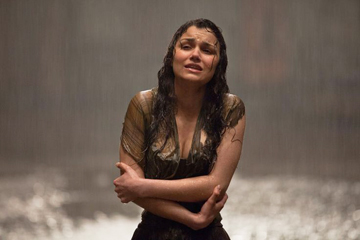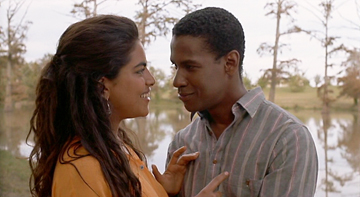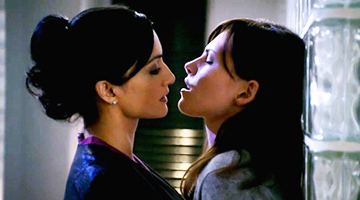Film: Please Stop!
A 2017 Wish List for Movies and TV Shows
By Wendy Caster
January 15, 2017
 Éponine (Samantha Barks) cries in the rain in Les Misérables |
WHEN DOES A movie/TV device become a cliché? And when does that cliché become unbearable? Is it the tenth time you see it? The hundredth? The gazillionth?
My modest proposal for 2017 is that the following be completely eliminated from TV shows and movies, at least for a century or so.
Let’s start with someone jolting upright from a nightmare. The first dozen times were probably pretty effective. Suddenly the sleeping character is sitting up, sweating and staring, the camera so close that she and the audience are practically nose to nose. It is indeed a nightmare-ish image. But after decades of overuse, it has lost its juice.
And then there’s the inevitable connection between crying and rain. Even on the sunniest day, when a character starts crying the windows are suddenly streaked with rain. In the worst example, the movie of Les Misérables, when poor Éponine sings “On My Own,” she is the only character getting rained on. She has her own rain cloud, the way Pig-Pen has his own dust cloud in Peanuts. Hey, writers and directors, people do actually cry in the sunshine! Funerals occur on sunny days! People break up in August at the beach! And isn’t the crying=raining association just a bit on the nose?
Perhaps the worst category for clichés is injuries. Take, for example, the dashing cut over the eyebrow that is the all-time favorite injury for movies and TV. First of all, in real life, forehead cuts bleed like mad. But even leaving that aside, the forehead cut has been done, and done, and done again. Enough.
Then there’s the instant recovery from a serious beating. This goes back at least as far as The Maltese Falcon and probably further. The hero gets jumped, and the villain(s) kick him in the abdomen, the head, the back, and any place else they can reach. In many cases, the beating would be sufficient to kill the victim—or at least cause brain damage—but hey, he’s the hero, so we know he’ll live through it (just as we know that the villains’ bullets will always miss him). Nevertheless, when the hero grimaces twice and then forgets that he was injured, and can still run and jump, it’s ridiculous. Yes, there’s such a thing as suspension of disbelief, but enough is enough.
Similarly, sometimes a character is shot or stabbed and almost immediately forgets it ever happened. In a recent episode of the highly entertaining Designated Survivor, an FBI agent is stabbed and only lives because a friend bandages her in time to keep her from bleeding out. She then gets ready to go out and fight again—because she’s the hero, obviously—and she puts her gun in her waistband right next to the injury without even wincing. It’s hard to tell if this was the “instant-recovery” device or just sloppiness, but either way, it was laughable.
 Sarita Choudhury and Denzel Washington in Mississippi Masala |
Another category full of exhausted clichés is sex. The category overlaps with the injury category, as when someone is punched in the mouth again and again, yet is able to do some hardcore kissing about 15 minutes later.
The clichés around sex are not only irritating but also may hurt actual people’s actual sex lives. How many people now believe that all sex begins with the couple unlocking the door and then falling into the apartment tearing off each other’s clothing?
And sex can start that way, certainly. But sometimes people like to talk first. Or have a glass of wine. Or make out for half an hour. They might take a moment to get birth control. And if the people are just getting home after drinking in a bar, they’ll need to go to the bathroom! Would incorporating some of these possibilities make the sex scene less sexy? Not if done correctly!
All too often, sex scenes are generic rather than character-driven, which makes them interruptions rather than additions. They can still be enjoyable, but they’re missed opportunities. Individualized sex scenes, which might include interruptions, negotiations, laughter, and klutziness, could be sexy and let us know more about the characters. As an example, in Mississippi Masala, Denzel Washington’s character asks Sarita Choudhury’s character if he can kiss her, if he can touch her, and so on. It’s incredibly sexy, and we learn a lot about both characters. Similarly, Kalinda’s take-charge sexuality in The Good Wife is both erotic and revealing.
 Kalinda (Archie Panjabi) and Agent Delaney (Jill Flint) in The Good Wife |
Another thing about movie/TV sex scenes: why is the woman always the one up against the brick wall or on the kitchen sink? Why can’t the guy be uncomfortable? And when the man sweeps dishes and glasses and food off of a table, who cleans up the mess? If he leaves it for her, then no one should ever have sex with him again.
There are many, many other examples, but I’m going to end with two stand-alones, one small and one large.
In the small one, someone at risk does not lock her door. It takes less than a second to lock a door, and most people do it without thinking. If your frightened hero leaves her door unbolted, then she isn’t that frightened, is she?
In the big one, two people fall in love not because they have anything in common, not because they make each other laugh, not because they have great chemistry, but because both actors’ names are above the title. It’s not enough! The audience needs to know why this particular couple falls in love, in this particular time and place. Otherwise, it’s all a big cheat.
(And I won’t even ask why scripts for blockbuster movies have to be so, so, so aggressively bad. I’m talking to you, Jurassic World.)
So, moviemakers and show runners, please give us all a present in 2017: New devices! We’ll thank you with huge opening weekends and loyal viewership. Don’t leave us crying in the rain!
( Wendy Caster is an award-winning writer living in New York City. Her reviews appear regularly on the blog Show Showdown. Her short plays You Look Just Like Him and The Morning After were performed as part of Estrogenius festivals. Her published works include short stories, essays, and one book.)
